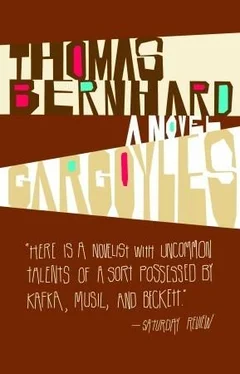This ordeal had quickly brought about the grandmother’s death. And her grandson, not yet six, had had his entire future ruined by it, my father said.
You could always conclude that the disasters in a man’s life derived from earlier, usually very early, injuries to his body and his psyche, my father averred. Modern medicine was aware of this, but still made far too little use of such knowledge.
“Even today most doctors do not look into causes,” my father said. “They concern themselves only with the most elementary patterns of treatment. They’re hypocrites who do nothing but prescribe medicines and close their eyes to the psyches of people who because of their helplessness and a disastrous tradition entrust themselves completely to their doctors. And most doctors are lazy and cowardly.”
Putting yourself at their mercy meant putting yourself at the mercy of chance and total unfeelingness, trusting to a pseudo-science, my father said. “Most doctors nowadays are unskilled workers in medicine. And the greatest mystifiers. I never feel more insecure than when I’m among my colleagues. Nothing is more sinister than medicine.”
In the last months of his life the teacher had developed an astonishing gift for pen drawing, my father said. The demonic elements that more and more came to light in his drawings shocked his parents. In delicate lines he drew a world “intent upon self-destruction” that terrified them: birds torn to pieces, human tongues ripped out by the roots, eight-fingered hands, smashed heads, extremities torn from bodies not shown, feet, hands, genitals, people suffocated as they walked, and so on. In those last months the bony structure of the young man’s skull became more and more prominent. And he drew his own portrait frequently, hundreds, thousands of times. When the young teacher talked, the disastrous way his mind was set became apparent. My father had considered taking some of the drawings and showing them to a gallery owner he knew in Graz. “They would make a good exhibition,” he said. “I don’t know anyone who draws the way the teacher did.” The teacher’s surrealism was something completely original, for there was nothing surreal in his drawings; what they showed was reality itself. “The world is surrealistic through and through,” my father said. “Nature is surrealistic, everything is surrealistic.” But he felt that art one exhibited was destroyed by the very act of being exhibited, and so he dropped the idea of doing anything with the teacher’s drawings. On the other hand, he was afraid the schoolmaster’s parents would throw away the drawings or burn them — thousands of them! — from ignorance of how good they were and because they were still frightened, anxious, and wrought up about these drawings. So he had decided to take them. “I’ll simply take them all with me,” he said. He had no doubt they would be handed over to him.
The teacher’s parents must have kept thinking of their sick son’s unfortunate bent whenever they looked at him during his last illness, my father said. “What a terrible thing it is that when you know of some deviation, some unnaturalness, or some crime in connection with a person, as long as he lives you can never look at him without thinking about that deviation, unnaturalness, or crime.”
From his bed the teacher had a view of the peak of the Bundscheck on one side and the rounded top of the Wölkerkogel on the other side. “You can feel this whole stark landscape in his drawings,” my father said.
The teacher’s parents said, however, that during his last days he had not spoken at all, only looked at the landscape outside his window. But the landscape he saw was entirely different from theirs, my father said, and different from the landscape we see when we look at it. What he depicted was an entirely different landscape, “everything totally different.”
We were not alone at our table for long. An elderly man, obviously the father of the restaurant owner, sat down with us. He kept asking us what we knew about the crime in Gradenberg. He did not let us eat in peace.
Down toward the Fochler mill the valley narrowed in a way that struck even him as sinister, my father said. I recalled that the mill is situated deep in a dark gorge; shortly beyond it the path winds up to the Saurau Castle.
We paid and left. In the restaurant a band of schoolchildren were being fed. They were given hot soup and admonishments not to make noise. What gruesome people these innocent creatures will inevitably become, I thought as we left the restaurant.
The Fochler mill is situated in the township of Rachau, but can be reached from Rachau itself only by a roundabout route forty miles long. That means that the mill is completely isolated. It lies directly below Saurau Castle, but the castle cannot be seen from the mill.
From Afling we drove directly into the gorge.
As it grew dark, I began thinking of my sister, whose wrist was still in a bandage.
A weekend was too short a time for me to be home from Leoben, my father said. We never got around to having a real talk. He himself, he said, could not have a good influence upon my sister, but possibly I could. Quite independently from one another, both of us had been thinking about my sister.
He used to watch her when she felt herself unobserved, my father said — when, for example, she stood musing in the garden, always at the same spot, staring fixedly at the wall of the shed. If he called her, she started and went to her room without a word. In his consulting room she was no help to him at all. She had the greatest dislike for everything medical. “In her I see my helplessness most plainly,” he said.
His science had failed him worst of all in the case of his child, he often thought; the most it had ever given him were faulty predications. Sometimes he took my sister along to visit relatives, but she felt ill at ease in any kind of society.
I shifted his attention to a herd of sheep that briefly appeared on the ridge above the gorge.
As we drove deeper into the gorge, it seemed to me that hundreds and thousands of images were crowding into my memory, and I saw nothing more.
He had to visit the mill owner once a week to drain the pus from the man’s ulcerated leg and change the dressing. It might amuse me, he said, while he was attending to this, to look at the aviary of exotic birds behind the mill. Now, as he mentioned the aviary, I remembered an association I had had with the Fochler mill. A funeral procession had passed by the Fochler mill on its way out of the gorge — I think it had probably come down from Saurau Castle — and the birds, hurling themselves in fright against the bars of the cage and disturbed by the intoned prayers of the people, had continually screeched at the funeral procession.
That had also been a Saturday. I reflected that most funerals are on Saturday. Baptisms, weddings, and funerals are almost always on Saturday.
But how different the mood was when we arrived at the mill this time. Two young workmen (“The sons,” my father said) were loading a wagon with sacks of flour. The turbines were making so much noise that we could not hear ourselves speak. I could not understand what my father said to me before he entered the mill.
The shutters were of black iron. There were no flowers to be seen.
Above the front door the Saurau coat of arms could still be distinguished. This whole land must once have belonged to the Sauraus, I think. Castles like Hochgobernitz always owned mills and breweries.
My father had said that Hochgobernitz was situated on the height overlooking the gorge, but I could not see it.
The men carrying and loading the flour sacks had not noticed our arrival.
The river is so noisy here that you can hear nothing else in the whole gorge.
Читать дальше












